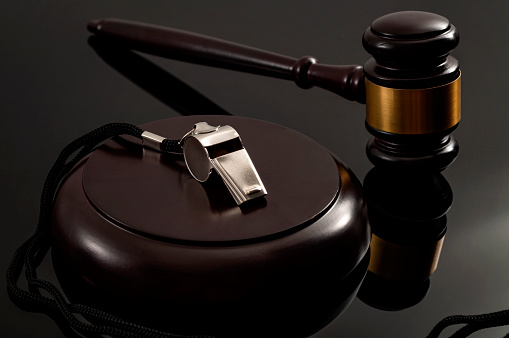What is the EU whistleblower directive and how will it affect your business?
29 December 2022 | 3 mins read
- HR resources

Purpose of the EU whistleblower directive
The EU Whistleblower Protection Directive is a piece of legislation adopted by the European Union in 2019 that aims to protect whistleblowers who report breaches of EU law. It applies to all member states of the EU and establishes common minimum standards for the protection of whistleblowers.
Under the directive, a whistleblower is defined as a person who reports on breaches of EU law in the fields of public procurement, financial services, money laundering, tax evasion, product safety, and public health. The directive requires member states to set up secure channels for whistleblowers to report breaches, and to provide protection from retaliation for those who report in good faith.
This directive allows individuals the option to report work-related misconduct through a three-tier system:
- Via internal (mandatory) reporting methods of organizations
- Via external competent authorities
- Via public disclosures to the media
Related read: What is the average settlement for a workplace discrimination lawsuit?

Current status of the EU Whistleblowing Directive
As of December 2022, the law has been adopted by 12 countries:
- Croatia
- Cyprus
- Denmark
- Finland
- France
- Greece
- Ireland
- Latvia
- Lithuania
- Malta
- Portugal
- Sweden
14 countries have been delayed in implementing the directive, including:
- Austria
- Belgium
- Bulgaria
- Czechia
- Estonia
- Germany
- Italy
- Luxembourg
- Poland
- Romania
- Slovakia
- Slovenia
- Spain
- The Netherlands
And one country, Hungary, has not yet started the process of adopting the directive.
Switzerland and the UK have decided not to impose the directive on their territories at all. However, Swiss or UK-owned businesses located in other Member States may be required to comply with the Directive.
Deadlines for implementing the directive
- Organisations with 250+ employees had until December 17, 2021 to comply.
- Organisations with 50-249 employees must comply before December 17, 2023.
Related read: Why is Konsistent a better harassment prevention solution than a one-time training?
Legal requirements for businesses
The EU Whistleblower Protection Directive of 2019 applies to all member states of the EU.
Under the directive, all businesses located in member states are required to establish secure channels for whistleblowers to report breaches of EU law in the fields of public procurement, financial services, money laundering, tax evasion, product safety, and public health. The EU Whistleblower Protection Directive applies to all companies operating within the European Union, regardless of size or sector.
Businesses in the EU are required to establish internal reporting mechanisms for whistleblowers to use, and to ensure that these mechanisms are effective and confidential. Companies must establish channels for employees and other stakeholders to report breaches in good faith without fear of retaliation. They must also protect whistleblowers from retaliation and take appropriate action in response to reports of breaches of EU law.
In addition, the directive requires member states to establish independent public authorities or private bodies to receive and handle reports from whistleblowers, and to provide legal protection for whistleblowers who report in good faith. Companies must also create internal procedures that protect whistleblowers from unfair dismissal and take appropriate disciplinary measures against persons found to have retaliated against whistleblowers.
Finally, companies must put in place procedures to ensure that reports are investigated and handled appropriately, with the aim of preventing or mitigating harm caused by breaches of EU law.
Related read: What is considered retaliation in the workplace?
How will the EU directive on whistleblowing impact businesses?
The directive will have an impact on businesses in the EU in a number of ways.
For example, businesses will be required to establish internal reporting mechanisms for whistleblowers to use, and to ensure that these mechanisms are effective and confidential. They will also be required to protect whistleblowers from retaliation and to take appropriate action in response to reports of breaches of EU law. This will obviously come at an extra cost to businesses, as they will need to invest in proper systems and procedures.
In addition, companies may be held liable for any damages caused by breaches of EU law that have been reported via their whistleblowing channels. This could result in significant financial losses if a breach is not addressed promptly or appropriately.
Finally, the directive could also lead to increased scrutiny of businesses, as they will be required to demonstrate that they are taking appropriate steps to protect whistleblowers and address any reports of breaches. This could lead to reputational damage if the public perceives that a business is not doing enough to ensure compliance with EU law.
Related read: 5 signs of a hostile work environment and how to prevent it
Final thoughts
Overall, the EU Whistleblower Protection Directive is intended to create a more transparent and accountable business environment, and to encourage the reporting of breaches of EU law.
It is likely to have a significant impact on businesses in the EU, particularly in sectors that are covered by the directive, such as financial services and public procurement. It is therefore important for businesses to ensure that they are fully compliant with the directive by its implementation date of December 17, 2023.
Failing to do so could result in significant financial losses and reputational damage, as well as potential legal action. It is therefore essential for businesses to start preparing now for compliance with the EU Whistleblower Protection Directive.






